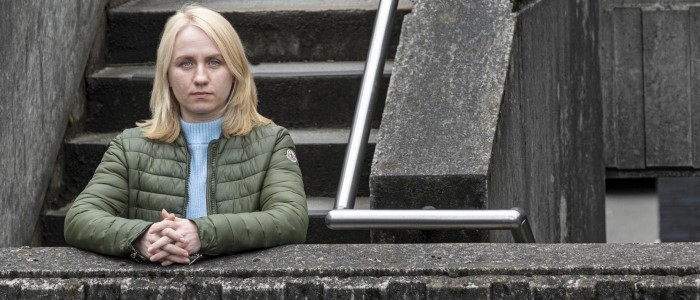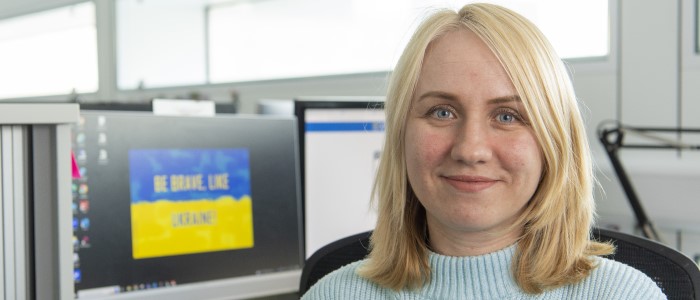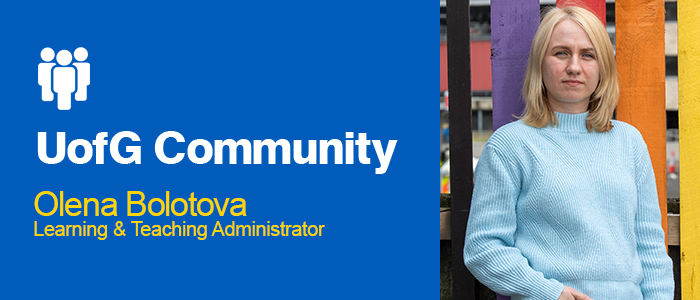In June 2022, Dr Olena Bolotova, who currently works at the University as a Learning & Teaching Administrator in the School of Medicine, Dentistry & Nursing, fled her home in the city of Kharkiv, in Ukraine, and moved to Glasgow.
Olena speaks to us about her journey here with her 13-year old son, and her work supporting Ukrainians in the city.
Kharkiv, a city in North-Eastern Ukraine, has been on the front line during much of the conflict. The city is often subject to missile strikes, which pose an ever-present threat to residents as well as damaging key infrastructure such as schools, roads and hospitals.
Against the backdrop of this conflict, which makes normal life near impossible, Olena left her home in the city to seek sanctuary in Glasgow, a city in which she had friends, and which had the potential for job opportunities in higher education, where she had worked previously.
As well as being located in a City of Sanctuary, the University of Glasgow is a recognised University of Sanctuary. This makes both the city and the University committed to building a culture of hospitality and welcome, especially for refugees seeking to relocate away from war and persecution.
In Ukraine, all men between the ages of 18 to 60 are subject to compulsory military service, meaning Olena’s husband and father are not currently permitted to leave to country. This situation left her with no choice but to move, alone with her son, so that he could continue his education.

“The schools are closed in Kharkiv, so children are trying to continue their education online, often from inside a bombshelter,” says Olena.
“In February we visited Ukraine for the first time since we left, and we were in Kharkiv when one attack started. It is scary, you don’t know where the next missile will land – maybe it’s your house. How can you be thinking about education in such conditions?”
Olena previously worked as an Economics academic and was Deputy Dean of a Faculty in Kharkiv University. She explains that her education and knowledge of English were important in helping both her find her feet in Glasgow, however this is not always the case for Ukrainians arriving in the UK.
“Around eighty percent of Ukrainians leaving the country have limited English,” says Olena. “If you are in this situation, it is very difficult to navigate the cultural and social structures in a new country.
“I am a member of the Association of Ukrainians in Great Britain (AUGB), which helps people access services such as the Scottish Refugee Council, Glasgow City Council and other government structures. Volunteers can offer translators and we have a weekly meeting with the Home Office, where representatives come to Glasgow and run a regular session with Ukrainians.”
Through the AUGB and the Ukrainian student society, Olena manages social events for the Ukrainian community in Glasgow, including cultural events and meet-ups. They have created libraries of Ukrainian books around the city, to help young people familiar with the language and culture.

“A lot of the smaller kids that have come here are now forgetting their language because they are only in an English-speaking environment for a long time. Our libraries are free and people can come and take any books they want to practice reading and speaking Ukrainian.”
Olena feels the support from the University community, and the people of Glasgow, has been an important factor in helping her to continue to advocate for those who have fled Ukraine in recent months.
“Here in the University of Glasgow I have received such huge support, like I’ve never seen before. I feel it every day from everyone, from School management, from colleagues, from students. A lot of people, when they learn I’m from Ukraine, ask me about my situation and how I’m doing. I know that it’s just simple and polite, but it makes a big difference.
“Myself, and lots of Ukrainians, are so grateful for the people who have surrounded us, supported us, taken care of us and haven’t forgotten about us – I can feel it here in the University and I can feel it every day.”
“It is so important that this support continues, and I would encourage anyone who wants to help Ukrainians in Glasgow register as sponsor for people who are in temporary accommodation, for example in hotels or on cruise ships.
“I’d also encourage people, where possible, to give Ukrainian people a chance to re-start their lives here in Scotland by offering work or other opportunities and become full members of society here is Scotland.”


